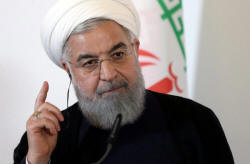Iran MPs summon Rouhani as U.S. pressure squeezes
economy
 Send a link to a friend
Send a link to a friend
 [August 01, 2018]
By Bozorgmehr Sharafedin [August 01, 2018]
By Bozorgmehr Sharafedin
LONDON (Reuters) - Iranian lawmakers have given President Hassan Rouhani
one month to appear before parliament to answer questions on his
government's handling of Iran's economic struggles, state media reported
on Wednesday.
It is the first time parliament has summoned Rouhani, who is under
pressure from hardline rivals to change his cabinet following a
deterioration in relations with the United States and Iran's growing
economic difficulties.
Lawmakers want to question Rouhani on topics including the rial's
decline, which has lost more than half its value since April, weak
economic growth and rising unemployment, according to semi-official ISNA
news agency.
Rouhani, a pragmatist who reduced tensions with the West by striking a
nuclear deal in 2015, is facing a growing backlash since U.S. President
Donald Trump pulled out from the pact in May and said he will reimpose
sanctions that seek to throttle Iran’s economy, including its lifeblood
oil exports.

ISNA said lawmakers also want to Rouhani to explain why, more than two
years after the landmark deal, Iranian banks still have only limited
access to global financial services.
The nuclear accord curbed Iran's nuclear program in return for lifting
most international sanctions.
Rouhani's summon coincides with further shows of public discontent. A
number of protests have broken out in Iran since the beginning of the
year over high prices, water shortage, power cuts, and alleged
corruption in the Islamic Republic.
On Tuesday, hundreds of people rallied in cities across the country,
including Isfahan, Karaj, Shiraz and Ahvaz, in protest against high
inflation caused in part by the weak rial.
Parliamentary speaker Ali Larijani was quoted by state television as
saying that Rouhani will have one month to attend a parliamentary
session and address the issues.
Rouhani canceled an interview on state television last week, a move that
seems to have encouraged many lawmakers to question him about his
economic records in the parliament.
Although 80 lawmakers submitted their questions for Rouhani, a Rouhani
ally, vice president for parliamentary affairs Hosseinali Amiri, called
the process "unconstitutional."
"Some lawmakers, who were convinced to take back their questions, were
encouraged by other members of parliament to submit the questions
again," Amiri was quoted as saying by Tasnim news agency.
[to top of second column] |

Iran's President Hassan
Rouhani attends a news conference at the Chancellery in Vienna,
Austria July 4, 2018. REUTERS/Lisi Niesner/File Photo

"MAXIMUM SHAKE-UP"
Trump said on Monday he would be willing to meet Rouhani without preconditions
to discuss how to improve relations, but senior Iranian officials and military
commanders rejected the offer as worthless and "a dream".
Addressing Washington, Hesamoddin Ashna, a Rouhani advisor, said in a tweet on
Wednesday that "You launched an economic war against us by imposing sanctions.
First stop this war and then ask for talks. Without preconditions means without
sanctions."
Israeli Regional Cooperation Minister Tzachi Hanegbi, a member of Israel's
security cabinet, said on Wednesday Trump's offer of talks was a "ladder" to
safety for a ruling system he said was on the point of collapse, but he was not
surprised that Tehran rejected it.
"It is hard to see the Iranians… being agreeable to such a meeting with someone
who only a few weeks ago basically sank an agreement with which they were so
pleased. But this is the right kind of process with the Iranians," Hanegbi told
Israel Radio.
Rouhani appointed a new central bank governor last week and accepted the
government spokesman's resignation on Tuesday, suggesting he accepts a need to
reshuffle his economic team.
In a separate letter to Rouhani on Wednesday, 193 lawmakers welcomed these
changes "as a good starting point" and asked for the "maximum shake-up" in the
government.

Hardline general prosecutor Mohammad Jafar Montazeri said on Wednesday Iran's
enemies were trying to divide government and people by creating economic
hardship. He vowed that those who follow the "enemies' plot" would face the
"harshest punishment".
(Reporting by Bozorgmehr Sharafedin, Additional reporting by Dan Williams in
Jerusalem, Editing by Raissa Kasolowsky, William Maclean)
[© 2018 Thomson Reuters. All rights
reserved.] Copyright 2018 Reuters. All rights reserved. This material may not be published,
broadcast, rewritten or redistributed.
Thompson Reuters is solely responsible for this content. |